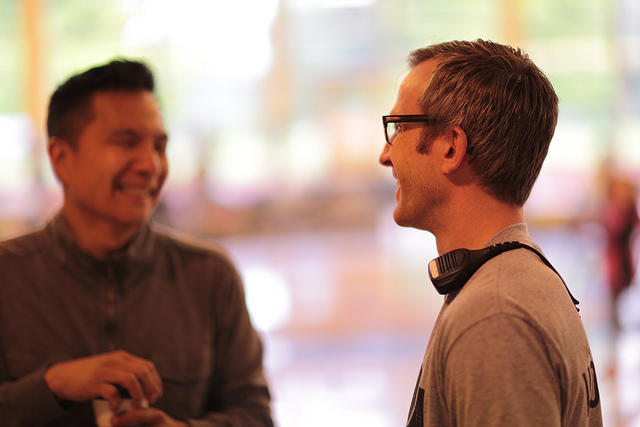blog
Several of the senior leaders I work with are frightened – and they bring their fear into their coaching. They’re afraid not only of the practical consequences of in some way not being up to the mark, but also of the shame – and they don’t trust their environments. The fear itself inhibits their performance and can increase their stress levels – and it can have serious effects for their organisations when their own wellbeing is damaged, when they’re afraid to innovate when there’s a business need to do things differently, or when they don’t dare to say what’s true. Coaching systemically and mindfully resources both the client and me – and the more I engage at a deep level with my own courage, resilience, capability, connectedness and resources, the less frightening life may be for the client.
Please e-mail me at lw@lindsaywittenberg.co.uk for a pdf of the article.
Photo by Victoria Pickering via Compfight
Dancing with fear: my latest article in Coaching at Work
Several of the senior leaders I work with are frightened. Not only is the fear corrosive at a personal level in terms of wellbeing, stress, confidence and shame, but it also inhibits performance and can have serious effects for organisations when individuals are afraid to innovate despite a business need to do things differently, or when they don't dare to say what's true. Coaching systemically and mindfully resources both the client and me - and the more I engage at a deep level with my own courage, resilience, capability, connectedness and resources, the less frightening life may be for the client.
Read more »Confidence, effectiveness and systems
Confidence that is depleted – which often results from an individual interpreting an external event or behaviour, and believing (albeit unconsciously) the message that they construct from it – leads very easily to effectiveness that is depleted. Looking outwards from the individual into their environment and the systems of relationships they are part of is often a more elegant and rapid process, offering more sustained and richer outcomes for rebuilding and re-resourcing, than cognitive approaches.
Read more »In the swim of things: my latest article in Coaching at Work
Some of my coaching clients have difficulty staying upright in the stream of their organisational cultures, especially when they aren't aligned with the values or behaviours in those cultures: their difficulty lies in being different, even though that may be exactly why they were recruited in the first place. This can cause significant stress.
Read more »Stress, relationships and business results
Line managers can unwittingly create damaging stress in the relationships they have with their reports. This can come from their modelling themselves against others whose values they don't share - and once they allow themselves to be their authentic selves their working relationships can be transformed. Systemic coaching blended with comfort working with mental health issues can resource the client in valuable ways.
Read more »Leadership in professional service firms
Leadership is particularly complex and demanding in professional service firms such as law and accountancy. In such firms not only is profit generated through each fee-earner's billable hours, but the distribution and clarity of power is less clear, more diffuse and less demarcated than in other organisations. Leadership is an ambiguous matter of high autonomy and yet often high consensus.
Read more »Do you know when to stop? My latest article in Coaching at Work
When is coaching actually performance management? My reflection column in the May issue of Coaching at Work explores my experience that there’s no clear, constant, easily-definable line between the two.
Read more »A Bigger Conversation
Relationships - between people, and between people and events, behaviours, beliefs, cultures and outputs - are the key to organisational health. Sometimes skilled, capable and experienced leaders don't seem fully able to occupy their authority, sometimes the same challenge seems to recur repeatedly. Such challenges may require a Bigger Conversation: a conversation that addresses not just individuals or individual issues, but which sees them as an ecosystem.
Read more »Influence, impact and culture change: a systemic view
When a new broom comes in to a senior role with high expectations, but is inexplicably unable to occupy their authority, the situation can benefit from a systemic constellations perspective. This means looking at what might have been ignored in the organisation’s remembering, what or who might have been excluded or unacknowledged - and especially what might not have been acknowledged about the contribution of a previous occupant of the role. Energy is then released and the leader is freed up to do what they do best.
Read more »Letting go of knowing: new article in 'Coaching at Work'
Clients and potential clients respond with more energy to their experience of how I am than to what I know - and equally, who I am, and how my ‘being’ shows up, have a significantly greater impact on my coaching than what I do.
Read more »Compassionate leadership
Compassion at work increases our willingness to trust: our brains respond more positively to bosses who have shown us empathy – and compassion increases the health and wellbeing not only of employees but also of the bottom line. When compassion is low, engagement and levels of discretionary effort are low, retention and recruitment are more difficult, stress and absenteeism are high, and success becomes more elusive.
Read more »











